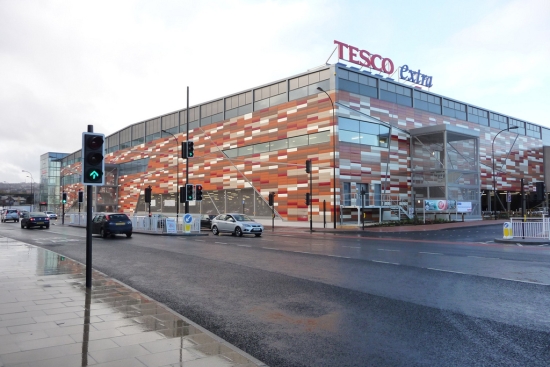Internet shopping poses a huge threat to retailers who have spent the past 10 years investing in their commercial property portfolio. This is especially pertinent to chains such as Tesco, which has built its business around so-called “Tesco Towns” – monopolising sites in order to take advantage of large local consumer bases.

Although Tesco has seen great success with both its click and collect and home delivery services, it is concerned that its huge hypermarkets will someday soon become unprofitable. So, as well as cutting down on commercial acquisitions, it now plans to diversify the offerings in these sprawling sites to attract customers through the doors.
The supermarket’s Watford Extra store, for example, will offer customers the chance to utilise a nail salon and community space when it reopens next week after undergoing an extensive refurbishment programme. It will also contain a Giraffe restaurant and Harris & Hoole coffee shop for customers in need of a break.
Tesco is also currently in talks with Sports Direct, with the view to set up concessionary space within its larger UK stores. This method has already proven successful in one Czech Republic hypermarket, where the supermarket giant managed to cut 40 per cent of its floor space by housing both Sports Direct and C&A.
Chris Bush, the Managing Director of Tesco UK, says; “In the past, large hypermarkets were popular because they offered a massive range of products and people liked being able to buy everything under one roof – it made life easier.
“The internet has changed all that – people don’t even need to leave their homes to go shopping and more people are using convenience stores for regular top-up shops.
“So we need to give them good reasons to come to our larger stores.”
While the supermarket space race may be off for the time being, then, pricing competition is hotter than ever thanks to the consumer need for value in the economic conditions. However, a recent study conducted by Kantar Worldpanel has shown that Tesco appears to be well ahead of main rival Sainsbury’s when it comes to keeping costs down.
The research shows that, in the four weeks to July 7th, the average item price in Sainsbury’s nationwide stores rose by 5.2 per cent when compared to data collected during the same period in 2012. Tesco, meanwhile, only increased prices by 2.4 per cent.
Furthermore, data pertaining to the past 12 months backs up this indication that Sainsbury’s is raising prices at a steeper rate than Tesco. This could potentially derail the supermarket’s plans to replace Tesco’s as the UK’s largest supermarket firm.
Yet thanks to the Brand Match scheme operating at Sainsbury’s, it can be presumed that price increases ahead of Tesco are largely focused upon its own brand items. While shoppers seeking branded goods may not be paying more than they would elsewhere, then, customers looking to stick to a strict budget could be losing out.
With supermarkets looking to remain ahead of the game and steal customers from rivals, it seems that the future of the retail industry depends entirely on the innovation and value offered by the UK’s leading chains.
Do you think a diverse offering would tempt consumers away from the keyboard and back into the supermarket aisles?